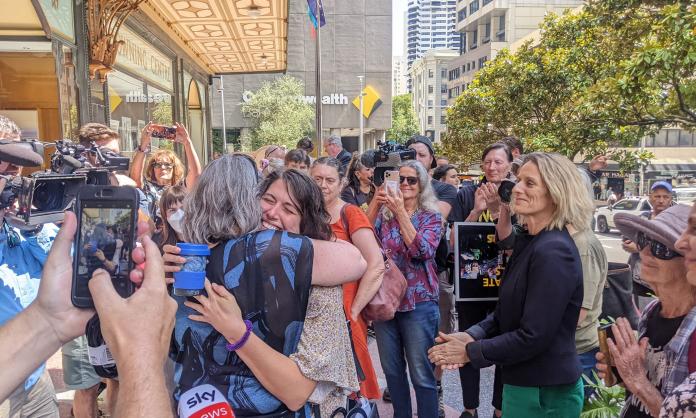The draconian fifteen-month prison sentence imposed on climate activist Violet Coco has been overturned in New South Wales.
Violet was arrested early last year after blocking a single lane of traffic on the Sydney Harbour Bridge. She and three other protesters—Alan Glover, Karen Fitzgibbon and Jay Larbalestier—had been demanding that more resources be allocated to firefighting services and the immediate rehoming of people displaced by floods and fires.
The four activists were the first to be sentenced under anti-protest laws rushed through the state parliament with bipartisan support. In December, Violet was sentenced to fifteen months in prison with a non-parole period of eight months.
During Violet and Alan’s appeal on 15 March, the prosecution argued that the peak hour protest caused a “massive inconvenience” to commuters. In response, district court Judge Mark Williams noted that it looked “like a normal morning on the Harbour Bridge”.
The defence argued that Violet had been sentenced under false information. Previously, the police alleged that the activists had “prevented an ambulance responding to an emergency”.
But they were forced to retract this lie on 7 March during the sentencing of Alan Glover and Karen Fitzgibbon. Glover’s solicitor, Julia Grix, spoke to the motorist who called 000 on the day of the protest and found that they did not call for an ambulance. She was also able to uncover the transcript of emergency services’ communications on the day, which did not indicate that there was an ambulance on the bridge at the time.
The success of Violet’s appeal is a victory on several fronts. For those arrested with her, it offers the hope of gaining justice for the repression they faced.
Jay Larbalestier narrowly avoided jail time when he was sentenced last year for his involvement in the protest. He was given the maximum sentence that could be served in the community—an eight-month Intensive Correction Order with strict conditions, a fine of $7,196 and 350 hours of community service.
Before he was sentenced, Jay had already spent four days in custody and 42 days under house arrest.
Jay attended the rally outside Violet’s appeal on 15 March and told Red Flag that he, like Violet, plans to pursue legal action against the police.
The success of Violet’s appeal is also a victory for basic democratic freedoms. As her lawyer Eddie Lloyd noted outside the court, the NSW police in recent months have cracked down on activists with seeming impunity:
“Our democracy is under attack. And it was Violet today, but it could be you tomorrow ... Friends in our community are getting arrested for Blu-Tacking a piece of paper on a statue, for drumming in the street, and friends are getting dragged out of their homes at midnight, hauled down to the police station to face a trespass charge.”
Violet’s freedom is also a victory for the climate movement. Bipartisan support for expanding the fossil fuel industry and for narrowing the bounds of what is considered lawful protest means that averting climate catastrophe will require much more determination.
“We are in a climate emergency. We are in the final hours to change the trajectory of hell on earth”, Violet said. “We must continue to raise the alarm on the climate and ecological emergency as loudly and as boldly as possible ... It is time for courage, if we are to save billions of lives.”








